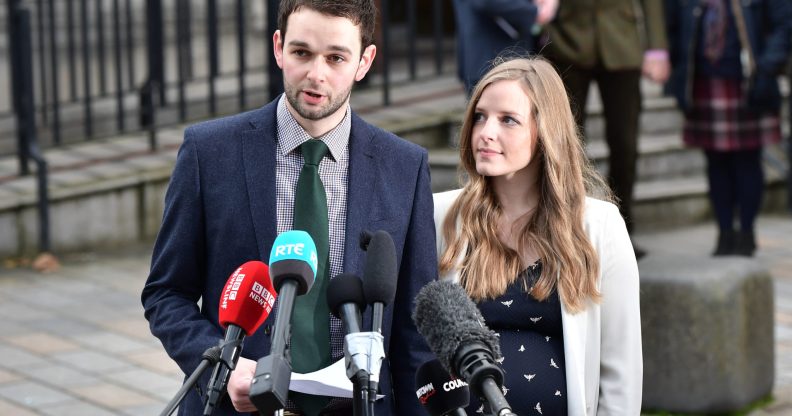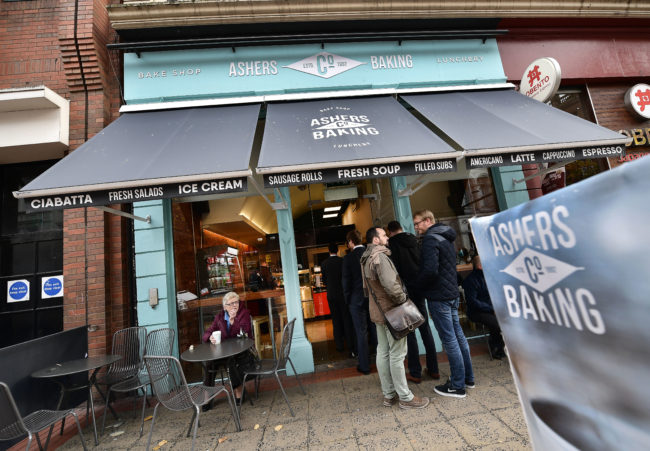LGBT activists ‘disappointed’ as UK Supreme Court sides with Ashers bakery in ‘gay cake’ row

Daniel McArthur, managing director of Ashers Bakery and his wife Amy McArthur (Charles McQuillan/Getty)
LGBT+ activists say the UK’s Supreme Court has set a “dangerous precedent” by ruling in favour of a bakery that refused to make a cake supporting gay marriage.
The ruling handed down by the UK’s Supreme Court on Wednesday (October 10) overturned lower court rulings against Northern Ireland’s Ashers Baking Company.
The Supreme Court quashed claims that Ashers had discriminated against gay man Gareth Lee on the grounds of sexual orientation by refusing a cake order bearing the slogan “support gay marriage.”
The five justices said: “The bakers could not refuse to supply their goods to Mr Lee because he is a gay man, but that is quite different from obliging them to supply a cake iced with a message with which they profoundly disagreed.”

Office workers and shoppers stand in line at Ashers Bakery on October 24, 2016 in Belfast, Northern Ireland (Charles McQuillan/Getty)
The judgment, which cited the bakers’ human rights protections for “right to freedom of thought, conscience and religion,” has been met with disappointment from LGBT+ activists.
John O’Doherty, director of Northern Ireland’s Rainbow Project, said in a statement to PinkNews: “We are disappointed by this judgment.
“Ashers agreed to make the cake. They entered into a contractual agreement to make this cake and then changed their mind. While sympathetic as some may be to the position in which the company finds itself; this does not change the facts of the case.
“We believe this is direct discrimination for which there can be no justification.”
A spokesperson for Stonewall told PinkNews: “The Supreme Court’s decision that Ashers bakery were not discriminatory in the so-called ‘gay cake’ row is very concerning for anyone who cares about equality. We will take time to review the judgement in detail.
“It is illegal for providers of goods, facilities and services in the UK to discriminate on the grounds of sexual orientation and/or gender reassignment.
‘The Court is saying the right of freedom of expression in effect allows people to discriminate against others based on who they are.
“This sets a hugely dangerous precedent which could be used by others to justify even more discrimination at a time when LGBT people still face exclusion, abuse and discrimination every day, despite that being against the law.”
Split opinions
However, not everyone agreed. In a statement to PinkNews, gay rights campaigner Peter Tatchell said: “This verdict is a victory for freedom of expression. As well as meaning that Ashers cannot be legally forced to aid the promotion of same-sex marriage, it also means that gay bakers cannot be compelled by law to decorate cakes with anti-gay marriage slogans.
“Businesses can now lawfully refuse a customer’s request to emblazon a political message if they have a conscientious objection to it. This includes the right to refuse messages that are sexist, xenophobic or anti-gay, which is a good thing.
“Although I profoundly disagree with Ashers opposition to marriage equality, in a free society neither they nor anyone else should be forced to facilitate a political idea that they oppose.”
Tatchell added: “Discrimination against LGBT people is wrong. But in a free society, people should be able to discriminate against ideas that they disagree with. I am glad the court upheld this important liberal principle.”
Dr. Michael Wardlow, Chief Commissioner of the Equality Commission for Northern Ireland, said: “The Supreme Court has overturned these findings and we will have to look at the implications of its judgment carefully.
“There is a concern that this judgment may raise uncertainty about the application of equality law in the commercial sphere, both about what businesses can do and what customers may expect; and that the beliefs of business owners may take precedence over a customer’s equality rights, which in our view is contrary to what the legislature intended.”

